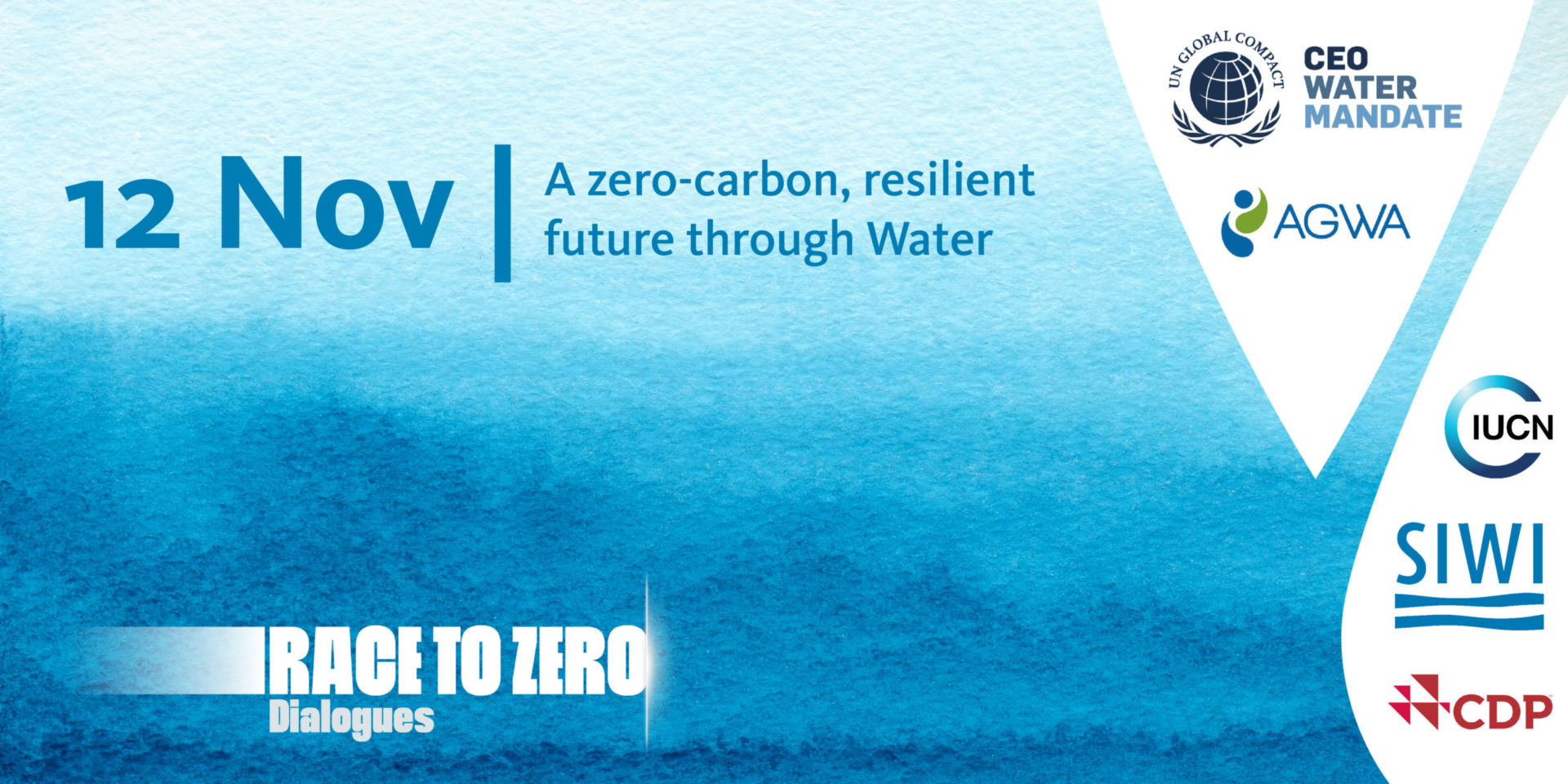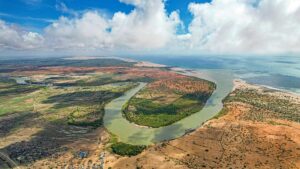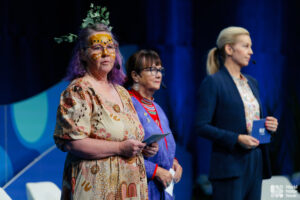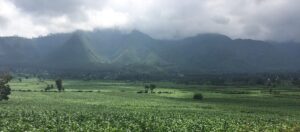- SIWI – Leading expert in water governance
- /
- Latest
- /
- Here is what happened at Water Day 12 November
Here is what happened at Water Day 12 November

On 12 November, SIWI and partner organizations arranged Water Day, a full-day event with world-leading water experts and thought leaders focusing on how water can help us in tackling the climate crisis. The day was part of the Race to Zero Dialogues, 9-19 November, with more than 100 virtual events focusing on concrete action to support the world’s carbon emissions reaching net-zero by 2050.
Water Day was opened by the United Nations High-Level Champions on Climate Change, Gonzalo Muñoz from Chile and Nigel Topping from the UK, who emphasized the crucial role of water for climate action.
Watch the Race to Zero November Dialogues, where SIWI has played a leading role in the campaign.
Also speaking in the opening, in a video message, was actor Matt Damon who is co-founder of Water.org and WaterEquity: “Drought, food scarcity, extreme weather – that is not the stuff of science fiction anymore, it is our current reality,” Damon said, adding: “The scale of the climate crisis is staggering, but you can’t let that be an excuse for not acting.”
Matt Damon described global warming as an “existential risk” and was immediately echoed by Professor Johan Rockström who emphasized that this risk is by now well proven scientifically: “We are at risk of destabilizing the life support systems on earth; fundamentally freshwater, being a precondition for the stability of the planet.”
Rockström, who is currently Director of the Potsdam Institute for Climate Impact Research, led the research team that in 2009 established the concept of Planetary Boundaries that the world cannot afford to transgress. Recently he and colleagues presented an article about “irrecoverable carbon” that is stored in freshwater ecosystems such as peatlands, mangroves, and marshes, as well as old-growth forests. If we do not manage to protect these ecosystems, global warming might become unstoppable, Rockström warned and called for greater awareness of the role of water in the climate process: “Freshwater is the bloodstream regulating our future on earth,” he said.
Martha Rojas Urrego, Secretary-General of the Ramsar Convention on Wetlands, highlighted the largely untapped potential of these water-related ecosystems which she said could achieve one-third of the emissions reductions needed to achieve two degrees Celsius. “Peatlands cover only 3 per cent of the surface of the land and they store twice as much carbon as all the national forests in the world. Mangroves store five times more carbon than other tropical forests per hectare. So, these ecosystems are really hotspots for mitigation,” Rojas Urrego explained.
She added that wetlands will also be increasingly important to protect us from the impacts of climate change since they reduce the risks of droughts and floods while also cleaning and recharging water. “However, despite all these values, wetlands are also the most endangered ecosystem today and I don’t think the public is aware of that,” Martha Rojas Urrego said, urging countries to protect wetlands as part of their commitments to the Paris Agreement.
Protecting People and Restoring Water Resources and Ecosystems | Watch
Inger Andersen, Executive Director, United Nations Environment Programme, spoke about the need for a new contract with nature and water in a session dedicated to transformative ideas and solutions that protect people and restore water resources and ecosystems in the Race to Zero.
“Sustainable water management is the way to get to the solutions, both for mitigating and to adapt to climate change. Both rely on strategies that require water to succeed: an integrated view of water, land-use and environmental flows is required to devise agriculture, industry and economic systems that are sustainable and that will allow us to deaccelerate climate change and to protect us from the realities of climate change,” she said and urged more countries to take water into account in their Nationally Determined Contributions under the Paris Agreement. Though most countries refer to water in their NDCs very few see water’s full potential, according to Andersen.
Ma Jun, who is the founder of the Institute of Public and Environmental Affairs in China, offered new ideas on how to work with water and climate. His organization has received a lot of attention for its innovative methods to create transparency around emissions into the air and water from cities as well as companies. The concept has been gradually expanded to cover more and more areas, which Ma Jun hoped would help both China and the world to build back better after Covid-19 “The carbon map we have just launched, seeks to consolidate a long-term pledge by distributing carbon targets city by city and facility by facility,” he said.
Non-party stakeholders’ Commitments to the Water Action Pathway
Recurring throughout the day were presentations of a great number of commitments and approaches to harness the potential of water for global climate action.
Examples included: the SDG 6 Global Acceleration Framework, presented by Federico Properzi from UN-Water; the Source-to-Sea Action Platform, presented by SIWI’s Ruth Mathews; the Carbon Disclosure Project’s Cities Water Disclosure, presented by Kyra Appleby; Aguas Andinas of Chile, presented by Marta Colet; and Water UK presented by Christine McGourty.
Also, there was a soft launch of the Community of Water Adaptation Practice by the partners of the Water Action Track: Global Center on Adaptation, Ministry of Infrastructure and Water Management of the Netherlands, the World Bank, and World Resources Institute.
The UNDP Equator Prize and Prize Winner Community presented videos featuring the Boon Rueang Wetland Forest Conservation Group of Thailand and Alianza Ceibo of Ecuador.
Producing food, energy, and infrastructure | Watch
Food production, energy and infrastructure are three sectors with a large carbon footprint as well as a substantial impact on water resources, what can they do to reduce their greenhouse gas emissions?
“The industrial agricultural system has never been more productive and efficient, but it is not sustainable,” said Ertharin Cousin, Fellow at Stanford University and former Executive Director of United Nations World Food Programme. According to her, the water sources and energy production are also increasingly under stress and face similar problems when water sources become more unreliable. The three have everything to win from starting to collaborate to find shared solutions, Cousin said.
The Water Reuse Renaissance | Watch
New approaches to water treatment and reuse will be crucial to reaching a net-zero carbon future and in this session, examples were presented from India and Mexico.
T Prabhushankar, Executive Director of the Chennai Metropolitan Water Supply and Sewerage Board, described how his city of 8 million inhabitants is the first in India to treat 10 per cent of its wastewater and make household rainwater harvesting mandatory.
Jessica Hernández, Manager of Studies and Projects, CONAGUA Mexico, talked about the Mexican capital’s strategy to reuse water for different needs and purposes
Another example highlighted in this session was the WaCCliM Roadmap for decarbonizing urban water and wastewater management, developed by the Deutsche Gesellschaft für Internationale Zusammenarbeit and the International Water Association. The Wastewater Zero – Business Action and Commitment from the World Business Council for Sustainable Development was also presented.
Building Business Water Resilience | Watch
The role of business and the finance communities was in focus during a session co-organized by CEO Water Mandate/UN Global Compact and CDP. All speakers agreed that they do see a major shift in attitudes even if it is still not fast enough.
“We have measured companies’ disclosure on water for 10 years and we see important improvements, though there are still only 10 per cent of companies that report on their water consumption,” said Carine Smith Ihenacho, Chief Governance & Compliance Officer, NBIM. She felt that most companies were more comfortable talking about climate than water, though a growing number of company representatives begin to see the interlinkages.
Synthesis of ideas and recommendations for the Road to COP26 | Watch
In the Closing session, it was noted that the day had indeed involved a broad range of concrete recommendations for the world to reach net-zero carbon emissions with the help of water, with many voices contributing.
The South African Youth Advisor and environmentalist Akhona Xotyeni emphasized the importance of this: ”On the road to COP 26, we must realize that to address the most pressing issues of our time we need to invite past, present and future generations to have intergenerational discussions,” she said.
“The world must now transform how it manages its water and nature-based solutions are the most important way,” concluded Carolina Schmidt, COP25 President and Minister of Environment of Chile.
SIWI’s Executive Director Torgny Holmgren was inspired by the many actions already taken: “Greenhouse gas emissions must be reduced for a greener, bluer and more resilient future!” he said, welcoming everyone to next year’s World Water Week on the topic Building Resilience Faster.
Most recent

Why sharing data matters for water cooperation in the Juba–Shebelle Basin
- Transboundary Water Cooperation
- Water and climate

TIARA in Zambia: Scaling resilient rainfed agriculture in the Zambezi Basin
- Agriculture and water
- Freshwater and ecosystems/biodiversity
- Resilience through water
- Water in landscapes
- Water and climate

Why climate action must integrate water
- Water and climate
- World Water Week
- Water governance

SIWI joins Wallenberg-funded forest resilience research




